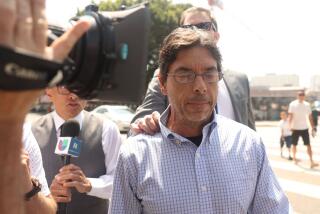Doctor Loses License in AIDS Quackery Case : Medicine: He injected patients with chemical of no proven value, formulated in kitchen sink of an O.C. radiologist.
A North Hollywood physician who injected AIDS patients with a homemade chemical of no proven value has had his medical license revoked, the first such action against a California doctor accused of AIDS quackery.
Administrative Law Judge M. Gayle Askren canceled Valentine Birds’ license after an investigation by state medical authorities found that he ordered catheters surgically implanted in seven AIDS sufferers so they could inject themselves with an untested substance that was formulated in the kitchen sink of an Orange County radiologist.
Investigators said Birds, 59, failed to consider effective AIDS treatments, lied to hospital officials about the purpose of the catheter implants and failed to properly monitor patients for infection and other adverse reactions after surgery.
Four patients died after injecting the substance, called Viroxan, although officials said there was no proof it directly caused the deaths. But they said at least two deaths were probably hastened by the treatment, and they accused Birds and Stephen Herman, a Villa Park radiologist who developed Viroxan, of using patients as guinea pigs.
Askren revoked Birds’ license last month, but the action was not made public until his 56-page ruling was released last week.
Herman, 55, who is disabled and has not practiced medicine full time since 1984, surrendered his medical license in July after state prosecutors agreed to drop civil charges of gross negligence, incompetence, dishonesty and other offenses, said his attorney, Andrew Lloyd.
Authorities said there is no evidence that Viroxan is safe or effective against AIDS, and that it was never approved by government regulators for testing or use by humans. They said Herman manufactured Viroxan without proper sterility controls.
Birds’ lawyer, Gene Girard, said Herman “hoodwinked” Birds into believing that Viroxan had government approval. Girard said Birds may seek to get his license back through a lawsuit.
Herman faces criminal charges in Orange County that he falsely advertised Viroxan and committed grand theft by taking money under false pretenses. The Los Angeles district attorney’s office is studying possible criminal charges against Birds.
Mark Snider, one of Birds’ patients who took the substance, vomited and suffered muscle spasms for three days afterward, investigators said. He was found lying immobile in his bathtub, where he had been for several days.
Snider, a well-known Hollywood floral designer, was admitted to a hospital and died four days later, in November, 1989, as a result of AIDS-related pneumonia, officials said. He also suffered from widespread infection associated with the catheter implanted in his chest.
Authorities said some of Birds’ patients who took Viroxan developed severe coughs, fever as high as 104 degrees and sensations of burning.
Birds, whose medical degree is in osteopathy, had practiced family medicine in Los Angeles and other Southern California communities since 1961. He had also served as medical director in a number of convalescent hospitals.
Medical officials said that because Birds’ patients had badly weakened immune systems, they should not have been subjected to catheter surgery--which carries high infection risks--for the purpose of administering an unproven remedy.
Authorities said Birds knew the substance was not approved by state or federal regulators, and falsely told hospital officials his patients needed catheters for treatment of cancer.
“Treating AIDS patients with an unproven remedy is worse than using patients as guinea pigs,” said state Deputy Atty. Gen. Roy Hewitt, who prosecuted Birds on behalf of the state medical board.
Lloyd, Herman’s lawyer, said Herman moved his manufacturing operations to Kenya after he was arrested last year, and Viroxan can still be purchased in Tijuana, Mexico.
He said Viroxan is undergoing tests at a “full-blown medical research facility” in Kenya, and the results are scheduled for publication soon in a major medical journal.
More to Read
Sign up for Essential California
The most important California stories and recommendations in your inbox every morning.
You may occasionally receive promotional content from the Los Angeles Times.










